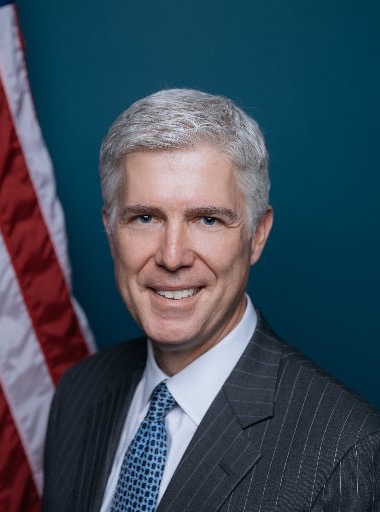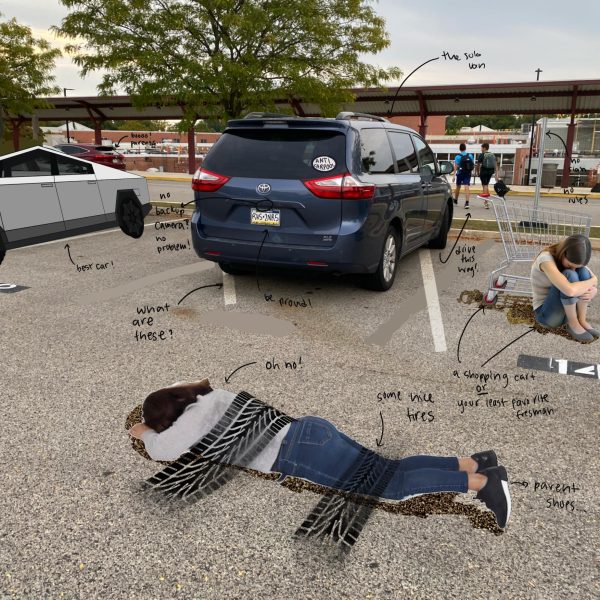Our Next Justice

April 3, 2017
In 2002 a lawyer and former clerk to Supreme Court Justice Byron White lamented that the Supreme Court nomination process had become “an ideological food fight.” That lawyer, Neil Gorsuch, now finds himself in the middle of the storm he once objected to. Gorsuch, a Denver judge on the 10th Circuit Court of Appeals, was nominated by President Trump to fill the position of Justice of the Supreme Court, the seat vacated a year ago by the late Antonin Scalia.
Gorsuch is known to be an extremely conservative judge aligned with traditional Republican views. He is also reserved, even-keeled, and modest. Many believe that Gorsuch is unafraid to uphold the rule of law and unlikely to simply follow Trump’s word.
Last month Trump lashed out against the judges around the country who ruled against his Muslim ban: he referred to a Seattle circuit judge as a “so called judge” and called his ruling “ridiculous.” The judge, James Robart, wrote in his decision, “the Executive Order adversely affects the State’s residents in areas of employment, education, business, family relations, and freedom to travel.” In response to Trump’s verbal assaults, Gorsuch directly challenged Trump, calling his attacks on the judiciary “demoralizing” and “disheartening.”
However, Trump likes Gorsuch for his hard-nosed, traditional views on women’s rights, gun rights, and the Affordable Care Act. Trump seems committed on axing the ACA as soon as possible, and Democrats have right to be scared. Gorsuch will no doubt bring another element of ultra-conservatism to the Supreme Court.
It’s been a busy week for Gorsuch, who completed a twenty hour long hearings process in front of the Senate Judiciary Committee. For four days the committee’s nine Democrats and six Republicans sparred with Gorsuch and each other. While the Democrats attempted to draw attention to some of Gorsuch’s perceived weaknesses, the Republicans worked to keep Gorsuch in a positive light. Gorsuch himself, meanwhile, remained silent on many of the key issues and decisions he was grilled on.
Early on in the proceedings of day three of hearings, ranking Democrat member Dianne Feinstein interrogated Gorsuch on his time as an official on the Judicial Department in 2005. On a document related to enhanced interrogation techniques he had written “yes” under the question “Have the aggressive interrogation techniques employed by the administration yielded any valuable intelligence? Have they ever stopped a terrorist incident?” The scribbled “yes” is a concern for those against the use of torture on suspected terrorists, which they feel violates the 8th amendment.
Senator Al Franken of Minnesota also brought up a contentious subject, this time a case that Gorsuch dissented on during his time on the 10th Circuit Court. In early 2009 truck driver Alphonse Maddin discovered that the brakes on his 18-wheeler had frozen over. Stranded in the cold with the cabin’s AC broken, Maddin waited in the freezing cold for a repair unit to arrive. With the temperature in the cabin reading seven degrees below zero, Maddin made the decision to unhitch the trailer and drive to safety. A few weeks later he was fired from TransAm Trucking. He then sued his former employers for doing so. The Department of Labor ordered TransAm to rehire Maddin, but the company appealed, sending the case to the 10th Circuit, which again ruled in favor of Maddin. However, Gorsuch was the one judge who ruled against him. Gorsuch reasoned that although the law states that a worker may “refuse to operate a vehicle” out of safety concerns, Maddin was given the chance to do that by remaining in the freezing vehicle. Instead, Maddin chose to operate the vehicle “in a manner he thought was wise”, giving TransAm the legal grounds to fire him. Such an adherence to the exact wording and literal meaning of law is called “textualism,” Franken, Feinstein, and the rest of the Democrats peppered Gorsuch on past decisions to highlight his penchant to side with corporations and rule against the common man.
Democrat Chuck Schumer added to the attack on Wednesday. He asked Gorsuch about a case he ruled on, Thompson R2-J School District v. Luke P., in which Gorsuch ruled against an autistic child whose parents contended he did not receive the education he was entitled to under the Individuals with Disabilities Act. Schumer asked Gorsuch why he ruled against the child, given that the Supreme Court ruled in an 8-0 decision that same day to reverse Gorsuch’s 10th Circuit decision. In asking this question, Schumer tried to prove that Gorsuch is even more conservative than any of the current justices on the Court.
Meanwhile, the Republicans on the committee did their part to enhance Gorsuch’s performance. Iowa Republican Charles Grassley asked Gorsuch if he would be okay with ruling against President Trump, to which Gorsuch replied, in what sounded like a canned reply, that he would “have no trouble” in doing so.
At first glance it seems that the Republicans and Gorsuch did their jobs in ensuring Gorsuch gets confirmed. If he does end up on the bench, he will certainly sway the court for decades. This past year the Court has been split in half ideologically, causing many 4-4 stalemates in decisions. Because of this, Schumer has said that they will try to block Gorsuch the same way Republicans blocked Merrick Garland’s nomination last year. Garland was one of the most qualified nominees in history; Senate Republicans left the seat open for a year and refused to consider a nominee for the first time ever. However, unlike the Republicans in 2016, the Democrats don’t have a majority in the Senate, so a filibuster would be pointless. The Democrats needed to unhinge Gorsuch in the hearings to have any shot at blocking his nomination. Two Democrats have recently come forward in support of Gorsuch, adding to the Republican’s 52 seat majority, and Gorsuch provided measured, calculated answers to many questions and refused to state his opinion on contentious issues. With the hearings finishing as late as 9 pm, Gorsuch came across as tired and a little annoyed at the questions as the hearings dragged on. However now that they’re over he must feel comfortable with the odds of taking a seat in the highest court in the land.
Gorsuch and the Key Issues
Free press: Although President Trump has railed against the press, calling media “the enemy of the American people”, Gorsuch has no history of restricting the media. In the past he has sided against libel laws, which seeks to protect famous individuals against misinformation that could harm their reputation. He has also repeatedly cited the first amendment in speech rights cases.
Assisted Suicide: Gorsuch has a long history with assisted suicide cases. In 2006 he wrote a book called “The Future in Assisted Suicide and Euthanasia”. His publication made clear that Gorsuch is opposed to assisted suicide, or suicide for terminally ill patients aided by a physician. Gorsuch believes that the intentional taking of human life, no matter the situation, is inherently wrong. Meanwhile, proponents of assisted suicide feel that patients in pain and already near death have the right to choose to end their suffering. In a 2015 poll, 68% of Americans approved of assisted suicide.
Abortion: Gorsuch does not have much of a history in abortion cases, but he did write about the landmark abortion case, Roe vs. Wade, that “under Roe’s express holding, a fetus does not count as a person”. But his writing does not support nor oppose abortion, but simply explain the reasoning behind the Roe vs. Wade decision.
On religion: In American Atheists, Inc. v. Davenport the 10th circuit court ruled that thirteen twelve-foot crosses erected in honor of fallen highway patrol officers violated the Establishment clause. Gorsuch dissented, stating that a reasonable observer would not believe the crosses endorse Christianity. And in the controversial Hobby Lobby case, Gorsuch ruled that the Department of Health and Human Services can not require secular corporations to provide contraceptive coverage as part of the corporate health insurance plans. These and other rulings hint that Gorsuch will be just as religiously conservative as his predecessor Scalia.






